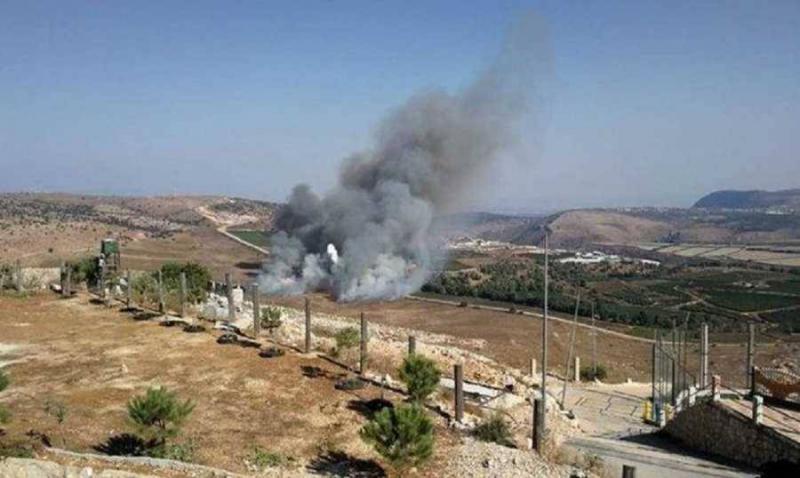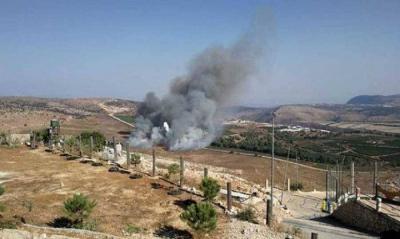"An-Nahar" noted that from two perspectives, the first being military and the second being media-diplomatic, Lebanon appeared on the third day of the escalating consequences of the "Al-Aqsa Flood" operation to be at greater risk of being dragged into the ongoing war between Israel and Hamas, along with other Palestinian factions in Gaza. On the military front, while attention is focused on Hezbollah and the implications of its repeated refusal to remain neutral in the increasingly frenetic war in Gaza and Israel, the announcement by "Saraya al-Quds" yesterday afternoon claiming responsibility for an infiltration operation from Lebanon into the southern border, which resulted in an attack against Israelis causing seven injuries, signals a serious concern, particularly as it unleashed heavy Israeli air and ground bombardments in the border area, leading to the death of three Hezbollah fighters who seem to be contemplating how to respond. Thus, the complexities of the situation in the south appear to be worsening, with unpredictable outcomes regarding whether it will unveil further chapters of the war that Lebanon is being forcibly drawn into, or if the anticipated involvement will remain contained and limited due to red lines that consider the collapsing reality in Lebanon and the dramatic possibilities if the war were to extend into it.
As for the media-diplomatic aspect, it took on a notably negative dimension with widespread reports about the signals for Hamas's attack on Israel being illuminated from an Iranian operations room in Beirut, despite Tehran denying its involvement in the war. The inclusion of Beirut in this context seemed a dangerous indicator, especially since it was raised in the American media. In light of this, the official position regarding the evolving field developments gained notable significance concerning attempts to curb the loosening situation in the south and to prevent Lebanon from slipping into the labyrinth of war, without overshadowing the growing fears regarding the Lebanese authority's inability to curb the looming dangers, as evidenced by the wide gap between the official containment discourse and that of Hezbollah and its allies.
In this context, it was officially announced that Prime Minister Najib Mikati is monitoring the situation in southern Lebanon through a series of international, Arab, and local communications, emphasizing that "the government's priority is to preserve security and stability in southern Lebanon, to maintain calm along the Blue Line, and to comply with Resolution 1701, stopping the ongoing Israeli violations of Lebanese sovereignty." Mikati reiterated, "Fortifying Lebanon against tumultuous developments requires hastening the election of a new president and halting existing political tensions, and in these difficult circumstances the region is experiencing, it is no longer acceptable for internal disagreements and divisions to continue over issues that have been overtaken by immediate events and potential repercussions. Provocative rhetoric must cease, and all wills must unite during a phase that is arguably one of the most dangerous Lebanon and the region have encountered, and the most ambiguous in terms of expectations, choices, and possibilities."
Regarding the alleged involvement of Beirut in planning the "Al-Aqsa Flood" operation, information from the American newspaper "Wall Street Journal" indicated that Iranian security officials assisted in planning the surprise attack launched by Hamas on Israel last Saturday and gave the green light for the operation during a meeting held in Beirut last Monday. It was reported that Iranian Revolutionary Guard officers worked with Hamas since August to plan aerial, ground, and maritime incursions, marking the most significant breach of Israel's borders since 1973. They disclosed that operation details were revised during several meetings in Beirut attended by Iranian Revolutionary Guard officers and representatives from four Iranian-backed armed groups, including Hamas, which controls authority in Gaza, and Hezbollah in Lebanon. An American official who announced the meetings stated that his country currently has no information to confirm this narrative. Additionally, the Iranian mission to the UN denied Tehran's involvement in the "Al-Aqsa Flood" attack.
In response, sources from Hezbollah confirmed to "Al-Jomhouria" that the resistance will inevitably respond to the Israeli bombardment targeting one of its observation towers, which resulted in the martyrdom of three of its members and injuries to several others, clarifying that it was not the party that conducted the infiltration from the western sector of the south. Here, it is essential to monitor the scale and nature of the response to determine whether the theater of military confrontation will expand further, especially since Israel officially acknowledged in the evening that it bombed three resistance sites. Later, Hezbollah issued a statement declaring that, "Following the martyrdom of three of our Mujahid brothers yesterday afternoon due to the Israeli attacks on Lebanese towns and villages, groups from the Islamic resistance initially attacked the Branit barracks, the command center of the Galilee Brigade, and the Avivim barracks, a command center of a battalion from the Western Brigade, using guided missiles and mortars which struck them directly."
An anonymous security source informed "Al-Jomhouria" that, "Given the rapid developments on the southern borders, the situation is open to all possibilities, and igniting the region is likely at any moment." This coincides with a UN call, confirmed by diplomatic sources to "Al-Jomhouria", directed at both Lebanese and Israeli sides urging them to contain the existing tension along the borders, exercise maximum restraint, and prevent slipping into a situation threatening stability on both sides of the border, noting that "UNIFIL" leadership is conducting intense communications in this regard with both sides.
On another front, "Nidaa al-Watan" reported that Palestinian camps in Lebanon have not quieted in their agitation in solidarity with Gaza and its resistance and the steadfastness of its people. With the escalation of Israeli aggression on the sector and many martyrs falling, the camp residents transitioned from organizing activities and protests to calls to head towards the southern border and march towards Palestine. Security sources informed "Nidaa al-Watan" that security forces, specifically the Lebanese army, are not inclined to allow camp residents to approach the border in a collective and organized manner at this stage and are conducting checks on vehicles and identities of passersby, setting up mobile checkpoints to prevent any breaches.
For several years, Palestinians have been prohibited from entering southern regions, including border areas, without obtaining permission from the Lebanese army, where they are assigned a number for their permit and a specific timeframe for it, which can be for a single occasion or range between three to six months; despite this, spontaneous solidarity movements occurred but were limited. In parallel, Palestinian circles confirm to "Nidaa al-Watan" that there is no Palestinian decision to open a military front in the south or to head towards the border in solidarity currently, but everything remains contingent on military developments and the aggression on Gaza, noting that the "Islamic resistance" attack on Israeli positions in the occupied Shebaa Farms is an indicator of standing by the Palestinian resistance.
Notably, the attack occurred less than 24 hours after the "Al-Aqsa Flood" operation and was promptly announced in the name of the groups of the martyr leader Hajj Imad Mughniyeh under the title, "On the path to liberate what remains of our occupied Lebanese land and in solidarity with the victorious Palestinian resistance and the steadfast and struggling Palestinian people." On the ground, activities supporting Gaza and its resistance have continued and were not limited to distributing sweets, organizing protests or car convoys, but took various forms, including raising Palestinian flags on house balconies and vehicles, and even motorcycles, broadcasting national and Islamic anthems via loudspeakers in front of shops, and wearing Palestinian keffiyehs.
The political official of the "Islamic Jihad Movement" in the Sidon area, Ammar Hourani, mocked the notion of "the invincible army," questioning, "Where are your Iron Domes, your David's slings, and the invincible army, and the fortified security system, and your elite infantry forces, and the drones patrolling the Gaza borders? They collapsed before the fists of the Mujahideen." He considered that "the blessed operation and the military battle led by the Palestinian resistance from Gaza once again demonstrate the fragility of the occupation entity, and the strength of the resistance and its insistence on continuing the path of liberating prisoners and liberating Palestine and its sanctities, and we are ready to engage in military confrontation against the occupation, and we will achieve more accomplishments and victories, God willing."
Regarding border control, amid the tension witnessed along the southern borders, Progressive Socialist Party leader Walid Jumblatt called on Hezbollah to manage the southern front, stressing that there is no need to open a new front. In commenting on the "Al-Aqsa Flood" operation, MP Abdel Rahman al-Bazari noted that "there are matters that are not up for discussion, and that the victory for the Palestinian resistance over the Zionist entity is clear, as this is a lesson and a new military tactic that will be studied for generations," pointing out in a statement to "Al-Anbaa" that "there is no doubt that the Zionist entity has been shaken, just as its role as a protector of Western interests in the region has been shaken; what has happened represents a qualitative shift that should be converted politically into Arab solidarity that includes all Arab countries, to support the rights of the Palestinian people; as this operation is akin to a military and political victory that will have significant repercussions on balances in the region."
Thus, the region undeniably seems to be heading toward a pivotal transformation following recent events, as "Al-Aqsa Flood" has overturned Israeli occupation calculations, imposing a new reality, and reminding of the legitimacy of the Palestinian issue and the struggle of the Palestinian people and their continuous will for decades.




